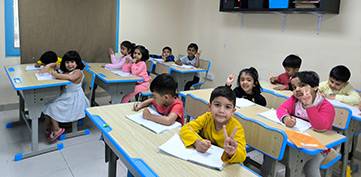Development in the cognitive sphere during this period can be termed essential because this is the moment the brain expands at a high pace and creates structures for learning, behavior, and health later on.
In more detail, the article intends to focus on the significance of ECE in promoting cognitive skills such as language, problem-solving, and critical thinking. Smartyca is a childcare and early education center in Abu Dhabi, offering programs such as nursery, preschool, daycare, and afterschool activities.
Theoretical Frameworks
To understand the above-mentioned consequences of early education for cognitive development, one must take into account the concepts of Jean Piaget and Lev Vygotsky.
Piaget’s Theory of Cognitive Development
Piaget proposed a stage-wise theory of cognitive development, which lays down the particulars of how children’s mental processes develop. Piaget postulated that a child progresses through four cognitive development stages detailing the infant’s progression through the preschool and school years: these stages include the sensorimotor, preoperational, concrete operational, and formal operational stages. ECE is imperative in easing the processes associated with the transition across the stages, especially into and out of the preoperational stage (2½-7 years), when children begin using linguistic, symbolic, and play to construct meaning.
Vygotsky’s Social Development Theory
In contrast, Lev Vygotsky used social factors to explain cognitive development. This gave rise to the notion of ZPD (Zone of Proximal Development), which refers to the difference between the child’s potential and actual development determined by the child’s independent activities.
Cognitive Development Areas Affected by ECE
Language and Literacy Skills
ECE provides an excellent environment for language and literacy development. Children broaden their linguistic repertoire by acquiring new vocabulary from different sources such as stories, songs, and conversations. In addition, it is imperative to introduce early reading and writing practices that would rationalize future literacy advancement in children.
Mathematical and Scientific Thinking
ECE also promotes simple numeracy skills, which include counting, sorting, and pattern recognition. Children have a natural urge to explore their environment, and an effective ECE program provides this need through discovery-based learning, especially during the foundation years, which are the beginning of science learning.
Problem-Solving and Critical Thinking
Through problem-connected activities that require the use of reason, collaboration, and experimentation, ECE fosters in the children good problem-solving abilities and critical thinking skills. Its enhancement and incorporation during this period enable the children to use creativity and innovation while tackling problems effectively in their future lives.
Long-Term Benefits of Early Childhood Education
Academic Achievement
Research findings have concluded that participation in high-quality ECE programs enables children to excel academically throughout their school-age echelons, especially when they advance to the next grade level and beyond. That is, they will be able to utilize higher education approaches or strategies and adopt favorable levels of participation in the learning process.
Development of Social and Emotional Skills
ECE is associated with cognitive, social, and emotional aspects. Kids acquire vital social skills such as teamwork, caring, and handling themselves emotionally, which facilitates bonding and adjusting to change.
Returns on Investment
ECE has economic advantages for society in the long run. Evidence suggests that children who attend good ECE programs are more likely to be productive and self-sufficient adults, reducing the costs of social services while increasing economic growth.
To Sum Up
The significance of early learning remains indubitable as far as developmental training is concerned. It fosters and ingrains the attributes that will enable the child to excel academically, socialize, and contribute to the economy. To ensure that every child receives good-quality early childhood education, the government and society need to pay attention to early education and solve the issues of availability and inclusion.
Featured Image Source: https://smartyca.com/wp-content/uploads/2024/02/preschools-1.jpg
